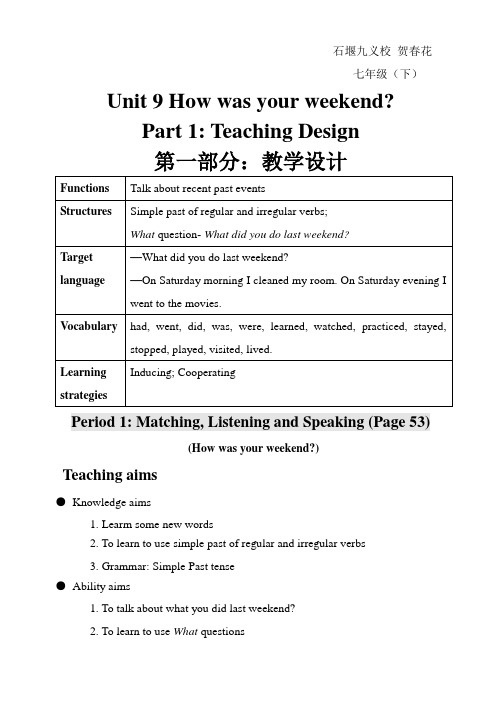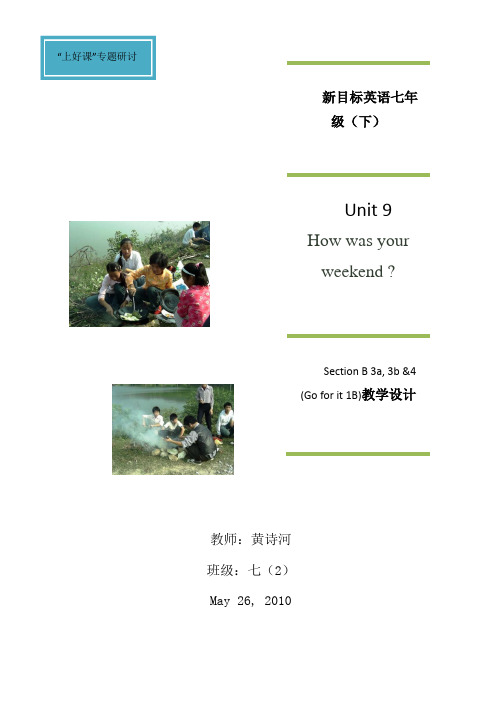英语:Unit 9 How was your weekend课件(人教新目标七年级下)Section A-2
- 格式:ppt
- 大小:1.90 MB
- 文档页数:39



石堰九义校贺春花七年级(下)Unit 9 How was your weekend?Part 1: Teaching Design第一部分:教学设计Functions Talk about recent past eventsStructures Simple past of regular and irregular verbs;What question- What did you do last weekend?Target language —What did you do last weekend?—On Saturday morning I cleaned my room. On Saturday evening I went to the movies.Vocabulary had, went, did, was, were, learned, watched, practiced, stayed, stopped, played, visited, lived.LearningstrategiesInducing; CooperatingPeriod 1: Matching, Listening and Speaking (Page 53)(How was your weekend?)Teaching aims●Knowledge aims1. Learm some new words2. To learn to use simple past of regular and irregular verbs3. Grammar: Simple Past tense●Ability aims1. To talk about what you did last weekend?2. To learn to use What questions3. To improve their listening and spoken abilities●Emotion aims1. To rich students’ extracurricular activities by communication2. To raise their interests in learning EnglishKey points1. Simple past of four kinds of regular verbswatch---watched practice---practicedstop---stopped study---studied2. Simple past of irregular verbsis havewas hadam hasare-were do-did go-wentDifficult points1. Simple past of irregular verbs2. Sentence pattern transformationI was a student. Were you a student?We went to Chengdu with the teacher.Did you go to Chengdu with the teacher?Mary has a scarf. Did Mary have a scarf? Teaching tools: PPT, chalk, exercise paperTime of duration: 45 minutesTeaching Procedures■Warming up by making a list of verb phrasesHi, class. We play a game first. We will make a list of verb phrases. Have a try. Now let’s try to put the verb phrases in their past forms.play sport, have a look, go to a movie, go to school, take a shower, go to work, go to bed, do homework, go home, take a walk, have fun, go to school, go to work, have fun,take a walk, wait for, take a photo, have a good time, look for, talk about, do some reading, go shopping, go for a walkplayed sport, had a look, went to a movie, went to school, took a shower, went to work, went to bed, did homework, went home, took a walk, had fun, went to school, went to work, had fun,took a walk, waited for, took a photo, had a good time, looked for, talked about, did some reading, went shopping, went for a walk1a Looking and matchingPlease look at the picture on page 53. What are they doing? They are talking about their last weekend doings.do my homework did my homeworkplay soccer played soccerclean my room cleaned my roomgo to the beach went to the beachplay tennis played tennisgo to the movies went to the moviesWhen we talk about the actions in the past we should use the past forms of verbs. Just like that above. There are two kinds of verbs, regular verbs and irregular verbs. For a regular verb we should add ed at the end of it, and for an irregular verb it has a different form, its past form. For example:Regular verbs Irregular verbspresent past present pastplay played do Didclean cleaned go wentstudy studied have hadNow please match the words with the pictures.did my homework dplayed soccer bcleaned my room fwent to the beach cplayed tennis ewent to the movies a1b Listening and writingHere is a conversation. Let’s listen to the tape and write the day and “morning”, “afternoon” or “night” below each picture.Have you got the answers? The right answers are like these:Picture b: Sunday afternoonPicture c: Saturday afternoonPicture d: Sunday nightPicture e: Saturday morningPicture f: Sunday morningListen again and repeat what you hear. Try to be familiar with these phrases and sentences. Now go to page 87 to read the tape scripts. While reading underline all the expressions and copy them in your notebook. .Useful expressions from the conversationHow was…? On Saturday morning, played tennis, on Saturday afternoon, went to the beach, on Saturday night, went to the movies, cleaned my room, player soccer, did my homework1c Pairing and speakingSince you just heard the tape, let’s do a role play practice. Ask each other about her weekendlike this:A: What did you do last weekend?B: On Saturday morning, I played sport.A: What did you do last weekend?B: On Saturday morning, I went to a movie.A: What did you do last weekend?B: On Saturday morning, I went to school.A: What did you do last weekend?B: On Saturday morning, I went for a walk.A: What did you do last weekend?B: On Saturday morning, I took a shower.Period 2: Listening and Speaking (Page 54)(So, did everyone have a good weekend?)Objectives●To learn to talk about recent past events●To learn to use simple past of regular and irregular verbsProcedures■Warming up by studying the grammar focusHi, class. What did you do yesterday? What did you do last weekend? Let’s go to page 54 to find out.What did you do last weekend? 上周末你做了些什么?I played soccer. We went to the beach. 我踢足球了。


初一英语Unit 9 How was your weekend?【本讲主要内容】Unit 9 How was your weekend?通过本课的学习我们应该能做下面的事:1. 学会动词的过去式。
2. 学会使用过去时。
3. 学会介词后接动名词的用法。
4. 学会过去时描写自己曾做过的事和他人曾做过的事。
【知识掌握】【知识点精析】一. 文化背景由于英语中有时态的要求,即不同的时态有不同的表达法,因此大家在学习时,注意积累,准确记忆。
这也是学好英语的基本要求。
二. 词汇用法本单元所涉及的短语及用法1. go 动词译为去, 动身go to sleep/go to bed 去睡觉go home 回家go to the movies去看电影go shopping去购物go for a walk 去散步go wrong 变坏,出毛病go over 复习,浏览go ahead 前面走,尽管去做go in for 从事于物做主语,表示运行Everything goes well. 一切顺利。
go 名词译为尝试Do you want a go? 你想尝试吗?be going to 打算,计划做某事用于一般将来时We are going to have a party at school next Sunday.have/has gone to 去某地了They have gone to New York. 他们去纽约了。
They have been to New York. 他们去过纽约。
have gone to 是指某人去某地,且人没回来。
也就是人不在本地。
have been to是某人去过某地了,且人已经回来了,也就是人目前在本地。
go on doing sth. 继续做某事After a break, he went on his speaking.停顿了一会,他继续他的讲话。
go on to do sth. 接着做(另一件事)He brushed his teeth, and went on to wash his face.他刷完牙,接着又洗脸。

教师:黄诗河班级:七(2)May 26, 2010新目标英语七年级(下)Unit 9 How was yourweekend ?Section B 3a, 3b &4 (Go for it 1B)教学设计“上好课”专题研讨“上好课”专题研讨Unit 9 How was your weekend?教案In this unit, students learn to talk about recent past events.教学目标通过询问怎样过周末,来掌握各种动词词组,互相间谈论自己怎样过周末。
How did the kids spend the weekend?A:语言目标描述周末所做的事情或所开展的活动。
B:能力目标能够用一般过去时来叙述周末所做的事情,并写出一篇短文,用来介绍上周所发生的事情。
C:目标语言1. A. What did you do over the weekend?B. I played tennis on Saturday morning.A. How was your brother’s weekend?B. It was great.2. A. What did he do over the weekend?B. He went to the movies.A. What about your friend, Anita?B. He had a party.教学难点分析Talk about recent past events.1. 重点一般过去时:(1)过去时动词四种规则变化A. play-playedB. die-diedC. stop-stoppedD. study-studied(2)不规则变化is, am-was are-were do-did go-went have/has-had sit-sat get-got2. 难点(1) He did his homework. 变成一般疑问句Did he do his homework?(2) How was your weekend?(3) I was very busy last night. 变成一般疑问句Were you very busylast night?(4) She often came to help us.(5) …sth. terrible(nothing interesting, anything great等教学流程Step1: Duty reportT: Good morning, everyone.Who’s on duty today?S:I am.T:OK. Come here please.Step 2 Revision1)T: First of all, let’s review the past form of verbs.play—played visit—visited practice---practiced study----studiedStep 3Ask students to point to the pictures and use the past tense to describe as many of the activities as possible. Point to and describe any activities they can't describe. For example, I played the guitar.Then point to the numbered activities described in the list. Name the activities and ask students to repeat each one,After that, ask students to match each numbered phrase with a picture by writing the letter of each picture in the blank in front of the correct phrase. As students work, move around the room answering questions as needed.Check the answerStep 4Call attention to the names Jim and Sally and the write-on lines under each name.Say, Now you are going to hear a conversation between Jim and Sally. They are talking about what they did over the weekend. Listen to the conversation and write what each person did.Play the recording the first time. Students only listen.Point out the sample answer, cleaned her room.Play the recording again. Ask students to tell what each person did. Remind students that they can look back at earlier activities in this unit to get spelling help, if they wish.Step5Ask a pair of students to read the dialogue to the class.Say, Now practice talking about what Jim and Sally did over the weekend. Practice in pairs- Use the conversation as an example.Help students find partners. Then say. First read the dialogue together. Read both parts. Then make your own dialogues like that one. Tell what Sally and Jim did over the weekend.As students practice, move around the room monitoring progress.Ask pairs of students to present their dialogues to the class.Step 6Point out the example in speech bubbles. Ask two students to read the dialogue to the class.Ask a student to say a conversation about what you did over the weekend. Help students find partners. As they practice their conversations, move around the room monitoring progress and giving language support as needed.Ask some pairs to present their real-life conversations to the class. Step 7Read the article to the class or have a student do it.Some students may not recognize the words shopping, mixture, and relatives. Answer any question. students may have about these or other vocabulary items. Write each new word on the board and discuss its meaning.Read the instructions. Expand on the instructions saying, Circle the things that you like. the things that are fun. Underline the things that you don't like, the things that are not fun.Review the answers. Students may have different answers.Step 8Point out the numbered blanks in the paragraph. Say, Write a suitable phrase in each blank. Remember to put the verb in the past tense. Point out that students can look at the pictures below the passage for ideas.Call attention to the sample answer. Ask a student to read the sentence to the class,Ask students to complete the activity individually.Check the answers.Step 9Ask students to name several things; as they did over the weekend.Ask a student to follow these notes and say what he or she did over the weekend. When the student is finished say. Now write the words you just said.Ask the students who finish first to report their sentences.Check the sentences and make necessary corrections- Other students may use these sentences as they complete their own work.Step 10 A Game : Guess “Who am I?”Ask the class to give you the names of some famous people. They can be .sports stars, musicians, artists, politicians, etc.Divide students into pairs to do the activity. As students work, move around the room monitoring progress and making notes of common language problems. Have some students tell the class who their partners are and what their famous partners did over the weekend.ExercisesShow some exercises on the screen. Have students finish them with the target language in class.Step11 SummaryAsk students to report what we have learnt this class.HomeworkWrite an article about the last weekend.Teaching reflection:。